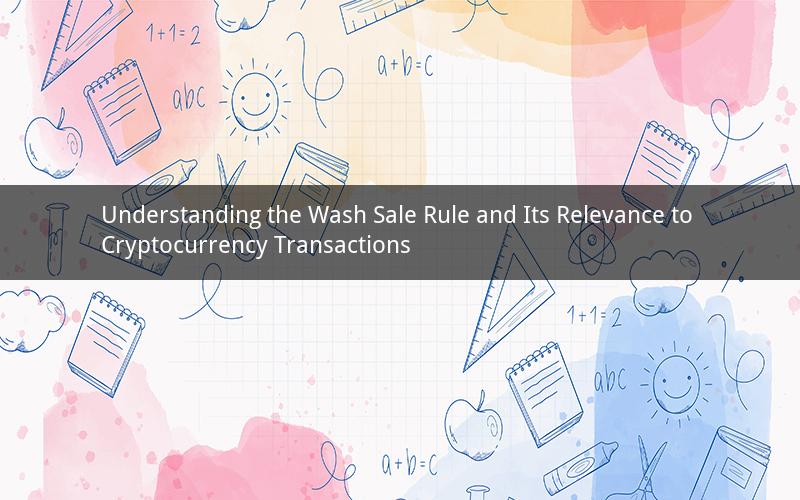
Introduction:
The wash sale rule is a regulation designed to prevent investors from recognizing a capital loss on a security and then immediately repurchasing the same or a "substantially identical" security. This rule is an important consideration for investors, especially those involved in the fast-paced and volatile cryptocurrency market. In this article, we will explore the wash sale rule, its application to cryptocurrency transactions, and the potential implications for investors.
I. What is the Wash Sale Rule?
The wash sale rule, as outlined in Section 1091 of the Internal Revenue Code, states that if an investor sells a security at a loss and buys a "substantially identical" security within 30 days before or after the sale, the investor cannot deduct the loss on their income tax return. The purpose of this rule is to prevent investors from taking advantage of short-term losses to offset capital gains, thereby avoiding paying taxes on their investments.
II. Applying the Wash Sale Rule to Cryptocurrency Transactions
Cryptocurrency, being a digital asset, raises questions about the applicability of the wash sale rule. While the IRS has not specifically addressed the application of this rule to cryptocurrency transactions, it is important to understand the principles behind the rule and how they may apply to cryptocurrencies.
1. Substantially Identical Securities
The key factor in determining whether the wash sale rule applies to cryptocurrency transactions is whether the new cryptocurrency is "substantially identical" to the cryptocurrency sold at a loss. This determination is based on several factors, including the same or similar blockchain, technology, and intended use of the cryptocurrency.
2. Timeframe
The wash sale rule requires that the purchase of the new cryptocurrency occurs within 30 days before or after the sale of the original cryptocurrency. It is crucial for investors to be aware of this timeframe to avoid inadvertently triggering the rule.
3. Reporting and Record-Keeping
Even if the wash sale rule does not apply to cryptocurrency transactions, it is essential for investors to maintain accurate records of their cryptocurrency transactions. This includes keeping track of the date of sale, the date of purchase, and the cost basis of both cryptocurrencies.
III. Implications for Cryptocurrency Investors
Understanding the wash sale rule and its potential application to cryptocurrency transactions is important for several reasons:
1. Tax Implications
By recognizing a capital loss on a cryptocurrency transaction, investors may be able to offset capital gains and potentially reduce their tax liability. However, if the wash sale rule applies, this option may be unavailable.
2. Investment Strategy
Knowledge of the wash sale rule can help investors develop a more informed investment strategy. For example, investors may choose to hold their cryptocurrency for longer periods to avoid triggering the rule.
3. Market Volatility
The fast-paced and volatile nature of the cryptocurrency market makes it even more crucial for investors to understand the wash sale rule. Investors may be more likely to engage in short-term trading, which could trigger the rule and limit their tax benefits.
IV. Potential Changes to the Wash Sale Rule
As the cryptocurrency market continues to evolve, there is a possibility that the IRS may update its guidelines on the wash sale rule to specifically address cryptocurrency transactions. This could result in changes to the application of the rule and the tax implications for cryptocurrency investors.
V. Conclusion
The wash sale rule is an important consideration for cryptocurrency investors. While the rule has not been explicitly applied to cryptocurrency transactions, understanding its principles and potential implications can help investors make informed decisions. As the market continues to evolve, it is crucial for investors to stay updated on any changes to the rule and its application to cryptocurrency transactions.
Questions and Answers:
1. Question: How does the wash sale rule impact an investor's tax liability when applied to cryptocurrency transactions?
Answer: If the wash sale rule applies to cryptocurrency transactions, an investor will not be able to deduct the capital loss on their tax return, which may increase their tax liability.
2. Question: What factors determine whether two cryptocurrencies are considered "substantially identical" for the purposes of the wash sale rule?
Answer: The factors include the same or similar blockchain, technology, and intended use of the cryptocurrencies.
3. Question: How can investors avoid triggering the wash sale rule when trading cryptocurrencies?
Answer: Investors can avoid triggering the rule by holding their cryptocurrencies for a longer period before repurchasing them or by diversifying their cryptocurrency portfolio to avoid holding "substantially identical" assets.
4. Question: Is the wash sale rule the only tax-related concern for cryptocurrency investors?
Answer: No, there are other tax-related concerns for cryptocurrency investors, such as capital gains tax, self-employment tax, and reporting requirements.
5. Question: What should cryptocurrency investors do to stay informed about potential changes to the wash sale rule and its application to cryptocurrency transactions?
Answer: Investors should regularly review IRS publications and updates, consult with tax professionals, and stay informed about the evolving cryptocurrency market.